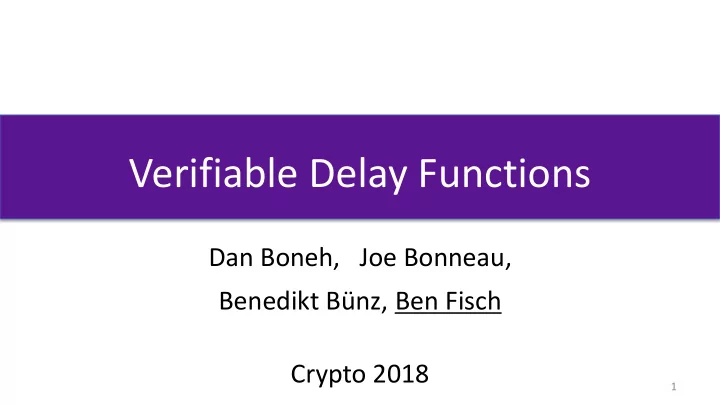

Verifiable Delay Functions Dan Boneh, Joe Bonneau, Benedikt Bünz, Ben Fisch Crypto 2018 1
What is a VDF? Verifier 2
What is a VDF? • Setup( λ , T ) ⟶ public parameters pp pp specify domain X and range Y • Eval( pp , x ) ⟶ output y , proof π PRAM runtime T with polylog(T) processors • Verify( pp , x , y , π ) ⟶ { yes, no } Time complexity at most polylog(T) 3
Security Properties (Informal) • Setup( λ , T ) ⟶ public parameters pp • Eval( pp , x ) ⟶ output y , proof π (requires T steps) • Verify( pp , x , y , π ) ⟶ { yes, no } 4
Related Crypto Primitives • Time-lock puzzles [RSW’96, BN’00, BGJPVW’16] o Trapdoor (secret key) setup per puzzle o Not ``publicly verifiable” • Proof-of-sequential-work [MMV’13, CP’18] o Publicly verifiable o Not a function (output isn’t unique) 5
VDF minus any property is “easy” 6
Modular square roots [ DN’92, LW’15 ] 8
Modular square roots [ DN’92, LW’15 ] log(p) squarings 1 squaring proof size = log(p) 9
Modular square roots • A “proto - VDF” M(p) = time complexity of Eval time: log(p) * M(p) multiplication mod p Verify time: M(p) Problem: Verify time not polylogarithmic in Eval time 10
Security Properties (Informal) • Setup( λ , T ) ⟶ public parameters pp • Eval( pp , x ) ⟶ output y , proof π (requires T steps) • Verify( pp , x , y , π ) ⟶ { yes, no } 11
VDF security more formally… Sequentiality Game 12
Part I: Applications of VDFs Permissionless consensus 14
Randomness beacon • Rabin ‘83 An ideal service that regularly publishes random value which no party can predict or manipulate 15
Many uses for random beacons 16
Randomness beacon ``Public displays” are easily corrupted 17
Public entropy source Assumption : (1) unpredictable, (2) adversary cannot fix stock prices 18
Stock price manipulation 19
Stock price randomness beacon Closing prices of 100 stocks: Hash(prices) 20 bits The problem : extractor • Once prices settle a minute before closing, attacker executes 20 last- 128 bits (seed) minute trades to influence seed. pseudorandom generator • Attacker can predict outcome of Lots of bits trades and choose favorable trades to bias result
Solution: slow things down with a VDF Hash(prices) 20 bits A solution: one hour VDF extractor • Attacker cannot tell what trades to execute before 128 bits market closes VDF Uniqueness: ensures no ambiguity about output , π 128 bits (seed)
Simple Bulletin Board Alice Bob Claire Zoe Mildly r a r b r c r z synchronous Public Bulletin Board output seed = Hash(r a || r b || ⋯ || r z ) ∈ {0,1} 256 Problem: Zoe controls the final seed !! 24
Solution: slow things down with a VDF [LW’15] Alice Bob Claire Zoe r a r b r c r z Public Bulletin Board (blockchain) Hash(r a || r b || ⋯ || r z ) ∈ {0,1} 256 seed, π H VDF 25
Part II: Constructions I. x y (reverse permutation) This work II. Followup: Pietrzak’18, Wesolowski’18 27
Hash Chain w/ Verifiable Computation • SNARK = “succinct non - interactive argument of knowledge” [G’10,GGPR’13, BCIOP’13, BCCT’13] • STARK = “succinct transparent non -interactive argument of knowledge” [M’00, BBHR’18] 28
Hash Chain w/ Verifiable Computation Problem • Proof generation slower than hash chain, without massive parallelism 29
Incrementally Verifiable Computation 30
IVC SNARK Optimizations 31
IVC SNARK Optimizations Slow x y x y Fast 33
IVC SNARK Optimizations Slow x y x y Fast 34
Square-roots vs SHA256 SHA256: c s 27,904 gates Square-roots: 4 gates Coordinate swap c s c s 35
Better asymmetric permutations? Slow Fast 37
Permutation polynomials Eval requires d parallelism d 2.85 parallel. infeasible for Adv. 38
Permutation Polynomials Holy Grail Exponentially large Eval: O(d) PRAM steps Exponential gap! Verify: O(log(d)) 39
Permutation polynomials Guralnick, Müler ’97 40
Permutation polynomials Guralnick, Müler ’97 41
Construction Summary Verification O(log(T)) SNARKs Proof size O(log(T)) Assumption SNARK/STARK + Sqr. rts. or ideal perm. polynomial Trusted setup None w/ STARKs or using “slower” verification, sequentiality not broken Quantum resistant Possibly with STARKs Simple No 42
Newer VDFs [P’18, W’18] • Let G be a finite cyclic group with generator g ∈ G G = {1, g, g 2 , g 3 , … } • Assumption : the group G has unknown size T squarings pp = (G, H: X ⟶ G) • Eval(pp, x): output proof π = (proof of correct exponentiation) [P’18, W’18] 43
THE END https://eprint.iacr.org/2018/601 Survey of VDFs https://eprint.iacr.org/2018/712.pdf 44
Recommend
More recommend